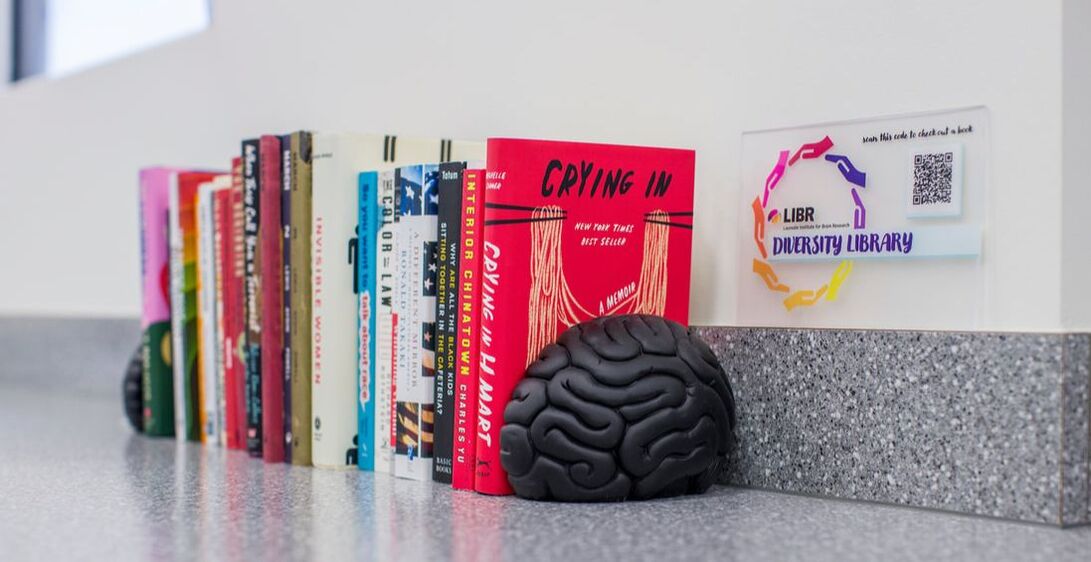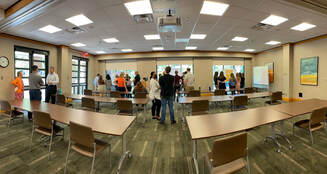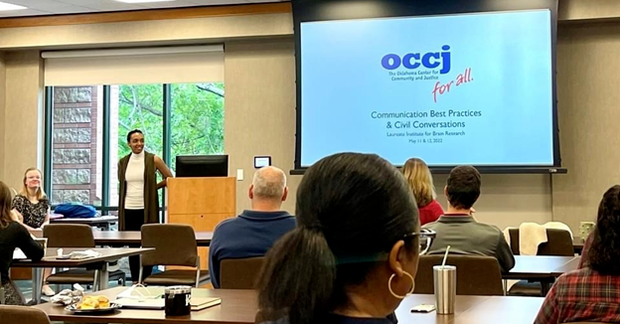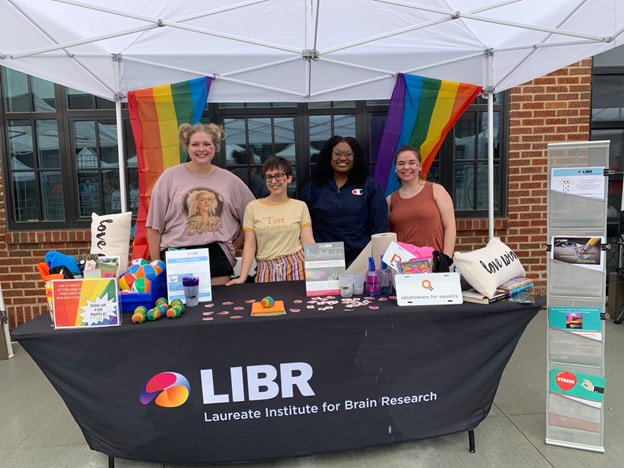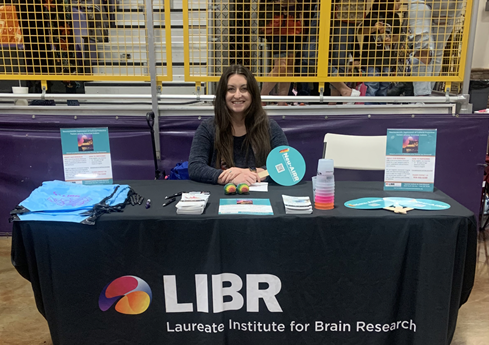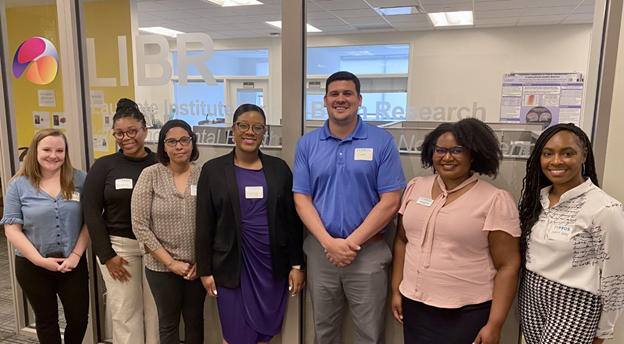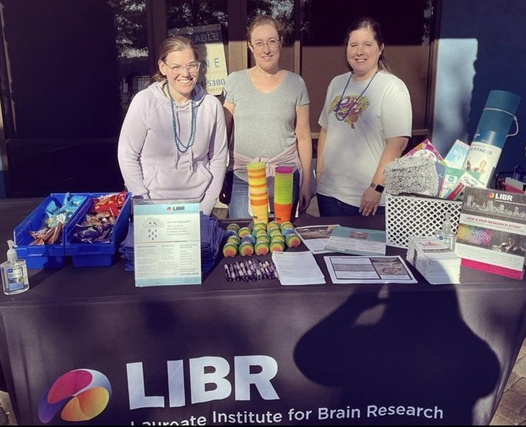LIBR's Diversity Initiative
The LIBR Diversity Initiative was established in response to Scientific Director, Dr. Martin Paulus’ Call for Action in June 2020, following the murder of George Floyd. The initiative is focused on deepening our understanding of mental health disparities, improving generalizability of our research findings to the community, and enhancing the quality of science by improving representation in the field by individuals from historically marginalized communities.
DiversityAim 1Increase the consideration of race and ethnicity when developing research questions, analysis plans, and assessments
Goals
|
EquityAim 2Increase the representation of under-represented minorities in the neuroscience and mental health research workforce
Goals
|
InclusionAim 3Enhance outreach efforts and partnership with communities and organizations with diverse race/ethnicity representation
Goals
|
Commitment to DEI
As workgroup and committee members dedicated to supporting Diversity, Equity, and Inclusion (DEI) initiatives, we recognize that, historically, research was conducted in a way that was deeply painful to diverse groups, and the impact of systemic and structural biases on mental health are too often ignored or underestimated. We recognize that although there has been much improvement in how science is conducted, there is still much work needed to enhance our understanding and appreciation of factors related to diversity. We also understand that there is no “finish line” to reach. The goal for the Diversity Initiative at LIBR is to continually work toward making science a more diverse, equitable, and inclusive space to conduct research that is impactful for the communities with whom we work.
We are committed to learning how racism has contributed to science, the systems that support science, our role in these racist systems, and how our actions can either contribute to these systems or help move us towards healing. We aim to enhance representation and strengthen our relationship with diverse communities in science.
We are committed to learning how racism has contributed to science, the systems that support science, our role in these racist systems, and how our actions can either contribute to these systems or help move us towards healing. We aim to enhance representation and strengthen our relationship with diverse communities in science.
"Perhaps one of the most powerful things I have learned over the past few years is how improving diversity in science – including having diverse representation of races, ethnicities, genders, and backgrounds in the scientific workforce and as study participants – enhances the quality of the science itself. To make progress towards improving mental health for the diverse world we live in, one must have input from as many different diverse minds as possible, with knowledge and lived experience from a plethora of varied and unique backgrounds.”
- Dr. Robin Aupperle, Chair of the Diversity and Inclusion Workgroup
Taking Action
To help accomplish the goals of the LIBR Diversity initiative, several subcommittees were established to focus on (a) institutional education and research, (b) philanthropy and community involvement, (c) student and fellowship training, (d) employee outreach and experience, and (e) participant recruitment and experience. Participation in these committees is open to all staff members and trainees at LIBR. Below, we summarize the specific aims and action items being pursued by these subcommittees. Although the aims are focused on issues of race and ethnicity, the efforts also extend to other populations that have been historically marginalized, discriminated against, or historically under-represented in science, such as: women, those from LGBTQIA+ communities, and those with disabilities.
Seminar Series
LIBR has established an ongoing, quarterly “Diversity in Mental Health and Neuroscience Research” seminar series for which we invite experts in related areas of research to present their work. We have welcomed:
|
Sierra Carter, PhD
Scientific Program Manager from Office of Programs to Enhance Neuroscience Workforce Diversity with the National Institute of Neurological Disorders and Stroke (NINDS), University of Georgia Nathaniel Harnett, PhD
Assistant Neuroscientist in the Neurobiology of Fear Laboratory, McLean Hospital (Harvard Medical School) Negar Fani, PhD
Director of Fani Affective Neuroscience Laboratory, Associate Professor, Department of Psychiatry and Behavioral Sciences, Emory University |
Marguerite Matthews, PhD
Program Officer, Office of Programs to Enhance Neuroscience Diversity, Division of Extramural Activities, National Institute of Neurological Disorders and Stroke Victoria O’Keefe, PhD
Mathuram Santosham Chair in Native American Health, Johns Hopkins Bloomberg School of Public Health |
Chad Forbes, PhD
Department of Psychological and Brain Sciences, University of Delaware Neha John-Henderson, PhD
Assistant Professor, Department of Psychology, Montana State University Paul Spicer, PhD
Professor, Department of Anthropology University of Oklahoma |
Reading Discussion Groups
LIBR has established an ongoing, monthly reading discussion group for all LIBR staff focused on issues of culture and diversity in the context of research. Previous subjects of discussion have included:
- Tulsa Race Massacre
- Mental health disparities for Black communities
- Mental health disparities for American Indian communities
- Issues facing women in science
- Issues facing LGBTQIA+ individuals in science
- Neurodiversity
Staff Development & Training Opportunities
|
LIBR ensures that advertisements for new positions are sent to universities and organizations with diverse students/members
LIBR has created a growing Diversity Library available to all staff
LIBR has designed monthly diversity newsletters sent to all LIBR staff that includes information on diversity-related articles, resources, volunteer opportunities, and events occurring each month
|
LIBR has established paid summer research internship opportunities for undergraduate and graduate students, as well as a two-year, post-baccalaureate “Diversity in Research And Multidisciplinary Neuroscience (DREAM-Neuro)” Fellowship
|
To support the culture of LIBR as an open and accepting environment for individuals from diverse backgrounds to work and thrive, annual trainings have been scheduled in collaboration with the Oklahoma Center for Community Justice (OCCJ)
Photo: The Oklahoma Center for Community and Justice giving a Communication Best Practices & Civil Conversations Training at LIBR in May, 2022. |
Community Involvement
|
The Diversity Committee has provided regular opportunities for LIBR employees to volunteer at Tulsa communities and organizations including:
LIBR has actively increased our involvement and partnership with organizations and clinics in the community to ensure that individuals from diverse backgrounds and communities are aware of opportunities to participate in research:
|
LIBR table at Tulsa Pride Festival in June, 2021
Neuroscience of American Indian Resilience and Risk (Neu-AIRR) lab table at the Choctaw Nation Pow Wow in Durant, OK in December, 2021
|
Tulsa Young Professionals’ Diversity Crew Meeting at LIBR in April, 2022
LIBR table at The American Foundation for Suicide Prevention (AFSP) Out of Darkness Walk in September, 2021.
|
Future Aims
The Diversity and Inclusion workgroup is proud of the accomplishments since being established in 2020 but also has numerous goals for this coming year and into the future. We look forward to establishing new community partnerships, further increasing the representation of under-represented minorities in science, and further enhancing our research through consideration of modifiable factors that may increase risk or protect against mental health problems for individuals of diverse races, ethnicities, and backgrounds.

